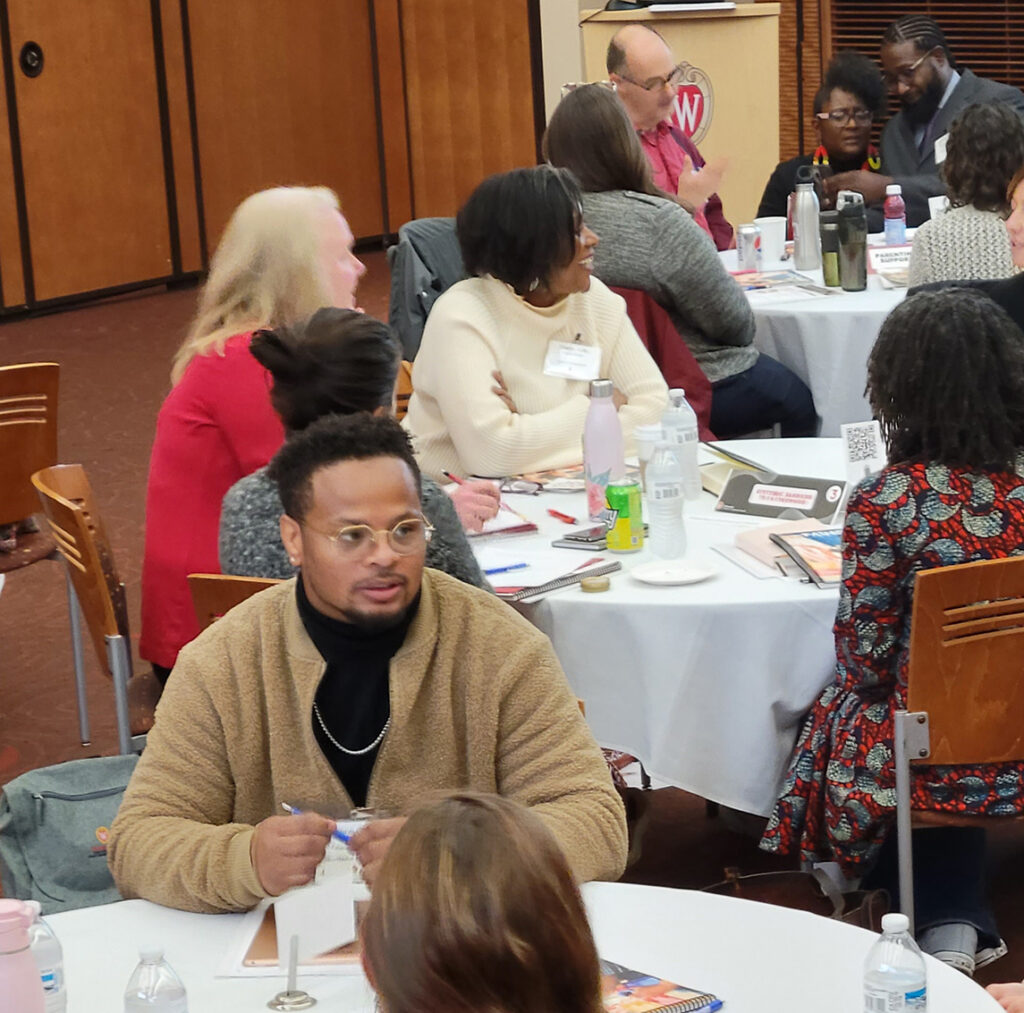For Eugene Crisler, an Employment Specialist and Fatherhood Program Facilitator at the Urban League of Greater Madison, shining a spotlight on fatherhood is a welcome wake-up call for Wisconsin. When Extension’s Fatherhood Needs Assessment report was released earlier this year, he and Extension educators started to discuss what fathers across the state were asking for and how to respond.
“It actually set a charge in me knowing and understanding that there are people like me that are going through all this, and there are people who are involved in this process and want to see change, that know there needs to be change,” Crisler said. “There’s a space for us to talk about these things, and it needs to be talked about.”

A big milestone for the report happened this October with the first Focus on Fathers Research Symposium. Dr. Danielle Hairston-Green, Human Development and Relationships (HDR) Institute Director at Extension, and Dr. Alvin Thomas, Assistant Professor of Human Development & Family Studies in the School of Human Ecology at UW-Madison, co-hosted the symposium convening experts, practitioners, and community members for a focused and collaborative discussion.
Challenging Fatherhood Stereotypes
When most people think of the stereotypical father, nurturing, caring, and involved are not the first things that come to mind. “Fathers can be people who take kids to sports. They can be people who take kids fishing. They can be people who bring money home. Or the guy who’s never home and is at the bar with his friends. But he is not the nurturer who is cuddling with his little child. He’s not the nurturer who is pushing the stroller with his baby. He is not the nurturer changing a diaper and testing a bottle on the back of his hand to make sure it’s just right for his baby. He’s not allowed to be that,” said Thomas, whose research considers how stereotypes and narratives shape our ideas of fatherhood.
However, current research tells a different story, showing a shift in how men define what it means to be a man and a father. “Overwhelmingly, men are beginning to define their masculinity and their identity based on their role in caring for and providing for their children,” Thomas said. The fathers he works with are not trying to run from their responsibilities. “They say they are here, they’ve always been here, and they are aiming for the betterment of their families and children.”
For fathers who want to be fathers, stereotypes can be harmful, keeping them from asking questions about parenting or asking for support for fear of being seen as unfit. As a result, their needs are often unmet, and their mental health can suffer.
Patricia Carroll, an Associate Professor and Human Development & Relationships Educator for Extension’s Dodge County office, said the intentional spotlight on fatherhood and stereotypes has had community groups rethinking their mental images of fathers and parenthood. “We started to see how we could change the way we promote parenting programs and the words we use. We asked ourselves if we say ‘parent’ but really mean ‘mothers,’ and when that was the case, we made changes in our thinking.”
Carroll has started to have those conversations with community partners in her county. While the shift might seem small, it’s made a difference in making fathers feel more welcome in their programs, she said.
Questioning Policies & Systems
Crisler said he’s excited to get fathers to advocate for themselves and to start talking about policies and systems. “We have fathers who don’t like the system, who find it keeps them from seeing their kids,” Crisler said. “We can do more than support each other. We can work together to question the systems that exist.”
“Systems are designed to do exactly what systems are designed to do. I feel in situations like this, the systems aren’t broken. They’re doing exactly what they were designed to do. Systems are not set up to support the dad in the same way they support the mom.” Hairston Green said. The question then becomes who are the systems designed for, and how can they be designed in a way that supports more parents being actively involved in their child’s life.
Extension’s Fathers in Focus Research Symposium and fatherhood outreach programs are part of ongoing programming to support parents and caregivers in every Wisconsin community. Learn more about our programming at https://extension.wisc.edu/family



